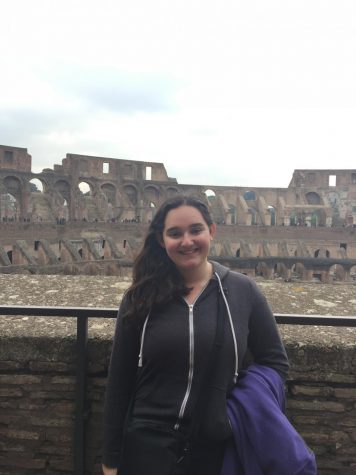Poetry week gives student opportunities to share their voice
April 12, 2019
ETHS kicked off the start of National Poetry Month on April 1, with Poetry Week, consisting of guest poets performing, writing workshops, and an open mic.
“April is National Poetry Month, so that’s why we started it, to kind of zero in on it. We’ve had a good experience with it, and it’s kind of evolved to where it is right now,” Assistant Librarian and point-person for Poetry Week planning Shari Iverson explained. “We just wanted to open up the road to poetry to our students and see that there’s lots of different kinds whether it’s lyrical, hip hop, or spoken word, and just more traditional writing.”
Poetry week has existed at ETHS for the past eighteen years. The theme this year was “Mark My Words,” which is used as a way to make poetry week more creative and engaging and suggest a guide for workshops.
“I really do enjoy writing and listening to poetry because I feel like it’s a way to express yourself and I’m a very expressive person,” sophomore Kalea Chatman said. “I think poetry doesn’t get as much attention like other things.”
Poetry week is open and welcoming to all students, so that everyone can express themselves through poetry. This year, 36 teachers signed up to bring at least one class to an event.
“One of the things that just astounds me the last number of years is how many teachers decide that they… want to bring their students to something. And we want it to be accessible, so Special Ed, AP, regular, honors. This should be a program for anybody,” Iverson said.
On Monday April 1, guest poets performed in the Upstairs Theater. Poets included Adam Gottlieb, who has been participating in the Chicago open mic scene since he was in high school; National Youth Poet Laureate Patricia Frazier; and José Olivarez, who published Citizen Illegal, an award-winning poetry book in 2018.
Librarians looked for local poets to participate, particularly through connections such as Young Chicago Authors, Louder Than a Bomb slam poetry competition and Northwestern University. Olivarez, who formerly lived in Chicago, now lives in New York City. He came back to the Chicago area to perform at Poetry Week and attend six other engagements.
“It’s been cool because as Louder than a Bomb has become a bigger and bigger thing, we kind of preceded at least the hype of it,” Iverson said. “[Poetry Week has] been something that our students are excited about. Young people can start telling their story, or telling something that’s important to them through spoken word or poetry or hip-hop.”
Later that day, members of the ETHS Slam Team performed during periods seven through nine. This idea for students to perform as well started around eight years ago.
“We… realized [that our poets are] not getting a chance to perform for their own school,” Iverson explained.
On April 2-3, students had the opportunity to attend writing workshops. Gottlieb, Northwestern graduate student Natalie Rose Richardson, Northwestern PhD candidate Jabari “Naledge” Evans and rapper/producer/songwriter ETHS alum Kweku Collins all led workshops.
“To me, poetry is truth, first of all, and it’s the attempt to tell that truth in the most powerful, the most effective way. So I think writing and good communication is poetry,” Gotlieb said.
In Evans’ workshop, he emphasized the concept that hip-hop is poetry and how hip-hop is used as an art form for youth and people of color.
“Most of what I try to talk about is the fact that there is intrinsic value to hip hop and rap music in particular is the voice of Black and Brown people of America, but it’s also now the voice of youth in America generally,” Evans said.
Evans also explained how traditional literary tools applied to various forms of writing and empowered students to analyze or write hip-hop music themselves.
Gottlieb, who has attended Poetry Week for the past six years, led a workshop where he started off by sharing a short poem of his. He had students listen to the song Take Me to the Future by Dead Prez and analyze the meaning.
“I hope that [students took] out of it is that the power of their own visions, and the power of language to express those visions, and I hope that people leave feeling a sense of hope and excited about what poetry can do for them personally and in terms of as a tool for social justice,” Gottlieb said.
On Friday, April 5, there was an open mic with food during lunch periods in the East Library. Any student was able to attend and perform.
“We just want people to see that poetry’s accessible to everyone, it’s a way to tell your story,” Iverson said. “Maybe they don’t know it, but they’re gaining literacy in trying to put this story together, whatever form they’re choosing. That’s valuable.”









